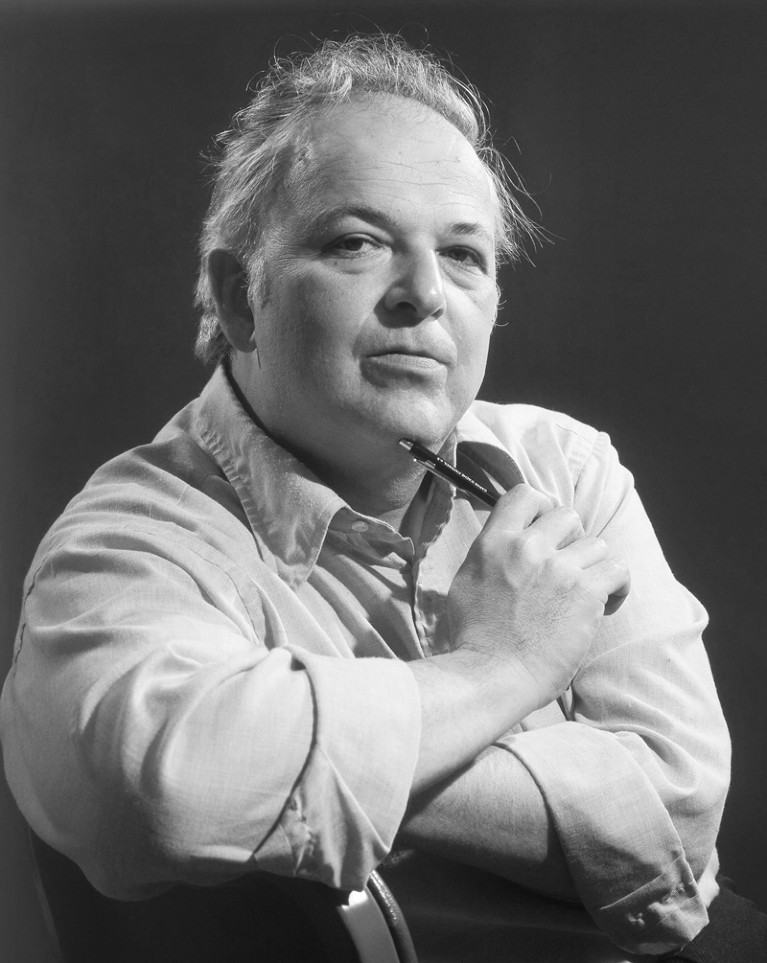
Credit: Eddie Adams/AP/REX/Shutterstock
The burst of scientific activity that began with the discovery of the J/ψ particle in 1974 is known to particle physicists as the ‘November revolution’, because it so radically changed their perspective. Charm quarks, heavier than the quarks that make up protons and neutrons, were predicted by theory that became the standard model of particle physics. Finding particles containing them opened up a new chapter in physics.
Burton Richter, who died on 18 July, made that revolution possible by designing and building the positron–electron accelerator SPEAR and an innovative detector facility, both at the Stanford Linear Accelerator Center (SLAC) in California.
Richter received the 1976 Nobel Prize in Physics for the J/ψ discovery. (The double name for the particle is because two experimental groups announced their results on the same day; Samuel Ting, who led the other experiment, shared the Nobel prize.)
It has to be said that Burt was not looking for this particle. He agreed to let his colleagues, Marty Breidenbach, Vera Lüth and Roy Schwitters, “waste a weekend” (as he put it) to redo measurements to check an anomaly in their data. They found this new particle immediately — noting in the log book that the data “came pouring in”. Within months, they made further discoveries that confirmed their interpretation of the particle as a charm quark.
This breakthrough would not have happened without Richter’s energy and persistence. Most physicists did not see SPEAR as a priority, and the US Congress would not fund it. After years of rejections, Richter redesigned the project to cut costs. He convinced his laboratory director and the Atomic Energy Commission to let him build it using ongoing funding. Once repackaged as an improvement to an existing facility, rather than a new project, it did not need congressional approval.
Burton Richter was born in Brooklyn, New York, on 22 March 1931, and grew up in Queens, another borough of the city. Graduating from high school with a passion for science experiments, he enrolled at the Massachusetts Institute of Technology, Cambridge, where he obtained his undergraduate degree in 1952 and his PhD in physics four years later. He moved to Stanford University and in 1963 to the new Stanford Linear Accelerator Center, where he spent the rest of his career. He was director of SLAC from 1984 until 1999, and remained involved in physics research and policy until the day he died.
Particle physicists generally fall into one of three categories: theorist, experimentalist or accelerator physicist. Each requires specialized expertise, and so few people master more than one. Burton Richter was the exception. He excelled at designing and building accelerators, as well as designing and leading experiments that used them.
Richter’s enthusiasm for storage rings — accelerators in which particles circulate for hours — began at Stanford. With physicist Gerald O’Neill of Princeton University, in New Jersey, Richter helped to build the world’s first pair of rings to store electrons. SPEAR was his next project, with electrons and positrons held in a single ring. The positron–electron project (PEP), a larger and higher-energy storage ring, came online at SLAC in 1980.
Burt was keen to push for ever-higher particle energies. To produce lots of Z-particles, a carrier of the weak nuclear force, he invented the SLAC linear collider. Short pulses of high-energy electrons and positrons, in beams the width of a human hair, travel for miles along the SLAC accelerator. They pass along separate arcs and then collide, occasionally producing Z-particles. The collider yielded, among other results, a tight upper bound on the mass of the Higgs boson and, just as importantly, it demonstrated the viability of the linear-collider concept for future machines. To achieve even-higher-energy collisions, Burt long advocated setting up two linear accelerators head-to-head. He instigated efforts to plan one, but such a machine has yet to be built.
Richter recognized that SLAC had to diversify to survive. When SPEAR was under construction, condensed-matter physicists Sebastian Doniach and William Spicer at Stanford University convinced him to add a small window in the vacuum pipe of the storage ring, so that the X-rays produced by circulating electrons or positrons could get out. This created the most intense X-ray source then available, opening the door to X-ray science. Intense X-ray pulses have many applications in materials science, chemistry and in deciphering biological structures. Today, this science is one of the main uses of SLAC.
Richter also brought particle astrophysics to the science mix at the lab, and supported a plan to convert the SLAC accelerator into the world’s first X-ray laser (itself a tour de force of accelerator design) to produce pulses of even-more-intense X-rays.
Burt served the community in other ways. He was a member of the JASON group, providing technical advice to the US government. He served on countless national and international science-advisory panels, and as councillor and president of the American Physical Society. His interest in energy policy led to his encyclopaedic book Beyond Smoke and Mirrors: Climate Change and Energy in the 21st Century.
Burt Richter cared about ideas, not status or recognition. He would share his technical insight and acumen with anyone to improve an experiment. If a postdoc or student had a good idea, he would support it; if he disagreed with a high-status scientist, he made it clear. He argued furiously in the service of getting to the answers, and expected others to do the same. He gave responsibility to those he found most capable, without regard to seniority.
Burt loved doing physics, constructing experiments capable of reaching frontiers and breaking beyond them.






